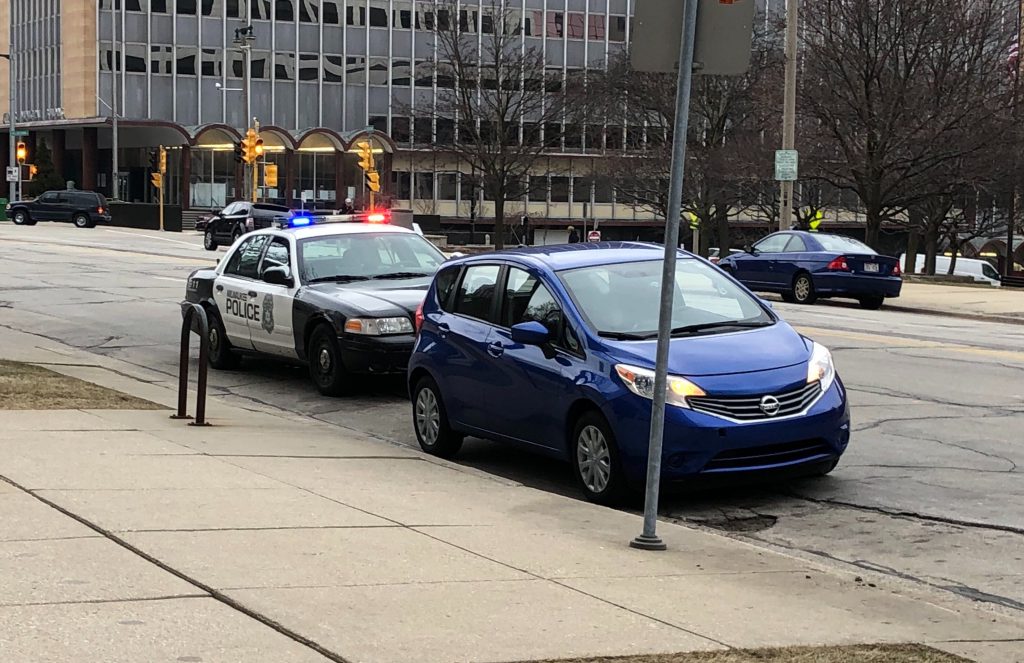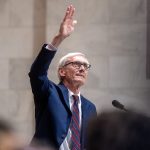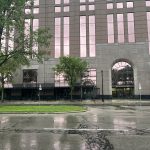Rethinking Traffic Enforcement
All the city news you can use.

A Milwaukee Police Department officer pulls over a driver on N. Broadway. File photo by Jeramey Jannene.
Every day at The Overhead Wire we sort through over 1,500 news items about cities and share the best ones with our email list. At the end of the week, we take some of the most popular stories and share them with Urban Milwaukee readers. They are national (or international) links, sometimes entertaining and sometimes absurd, but hopefully useful.
To end police violence, get rid of the traffic cop: Berkeley is the first city in the country to begin rethinking how police interact with the public, specifically around traffic violations. It happened in part because of a young local activist Darrell Owens, who thinks minimizing traffic interactions and designing better streets are key to reducing police brutality. (Brett Simpson | The Atlantic)
The climate disaster is already here: The last time the Earth was this hot was around 125,000 years ago and the increase in temperature over the last century is unprecedented in known history. The climate disaster described by scientists is not coming, it’s already here. In this interactive piece, the authors describe what happens if the Earth warms another 2 degrees Celsius including devastating heat waves and floods. (Oliver Milman, Andrew Witherspoon, Rita Liu, and Alvin Chang | The Guardian)
Experiment reduces the emissions for package delivery: A pilot program to deliver packages by E-bike in Seattle found that each package’s emissions were reduced 30%. Emissions counted included the truck trip to the microhub and deliveries on the bikes in the designated delivery zone. Additionally, researchers found that traffic was reduced by half as the bikes from the hub served more direct trips. (Kristin Toussaint | Fast Company)
Philadelphia remains segregated: Philadelphia’s neighborhoods remain one of the most segregated in the country according to an analysis of the 2020 Census by the Philadelphia Inquirer. In this interactive piece, the authors discuss how neighborhoods remain the same as the rest of the country becomes more integrated. To change this, researchers believe that reforming zoning and creating access to capital for those without can make a big difference. (Aseem Shukla, Michaelle Bond | Philadelphia Inquirer)
Quote of the Week
It’s not a food desert, because the desert is a natural state. Food apartheid is where systems are in place that breed these types of things.
-Chicago activist Asiaha Butler discussing food access in National Geographic.
This week on the podcast, Duncan Hwang, interim co-director of the Asian Pacific Network of Oregon, and Gauri Rajbaidya, architect and senior associate at SERA Architects discuss the emerging Jade District in Portland.
Want more links to read? Visit The Overhead Wire and signup.
Urban Reads
-
Congestion Pricing Cuts Air Pollution in New York City
 Dec 14th, 2025 by Jeff Wood
Dec 14th, 2025 by Jeff Wood
-
We Think We Love to Drive. But Do We Really?
 Dec 7th, 2025 by Jeff Wood
Dec 7th, 2025 by Jeff Wood
-
Can Scott Wiener Tackle America’s Housing Crisis?
 Nov 23rd, 2025 by Jeff Wood
Nov 23rd, 2025 by Jeff Wood





















